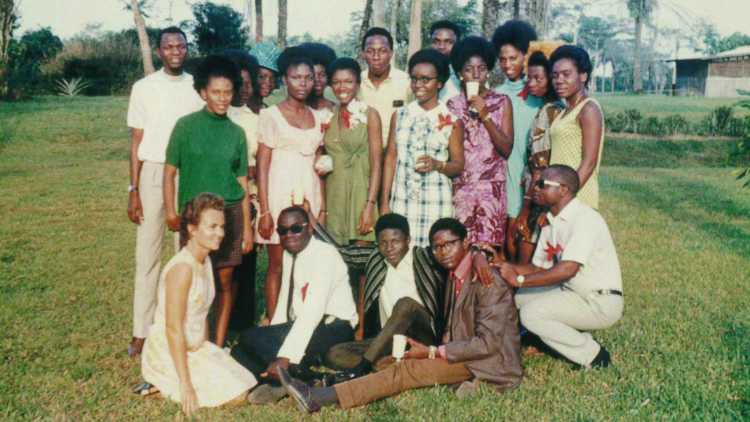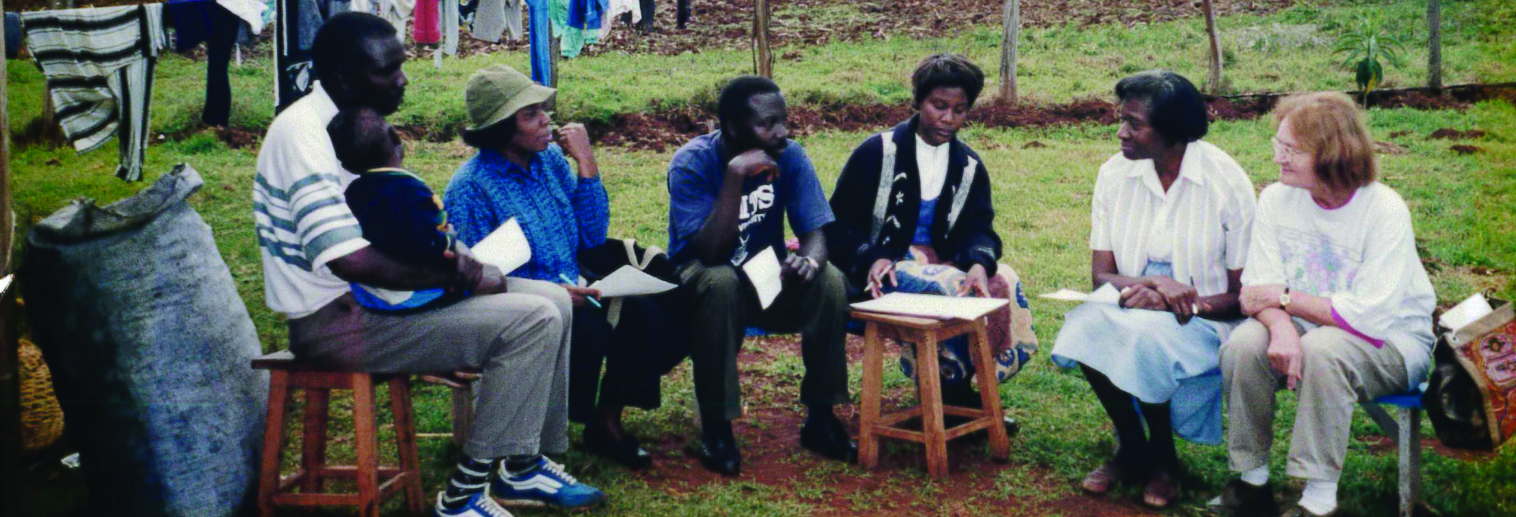
A nursing faculty meeting at the home of public health teacher Sammy Lagatt
An Educator for Africa
Helen Kohler, visiting professor of nursing at Moravian College, grew up on a chicken farm near Emmaus, Pennsylvania, during the ’30s and ’40s. She followed a burning desire to explore the world and found her mission in educating the poor.
By Elizabeth Shimer Bowers
Ask epidemiology professor Helen Kohler the best way to improve public health in countries with scarce resources, and her answer may surprise you: “Send girls to school.”
She admits that immunizations, clean drinking water, and sustainable agriculture all play a critical role. “But an educated woman will make sure her baby goes to a clinic, even if her mother-in-law suggests otherwise,” she says. “An educated woman will get what a baby needs, and a baby who makes it to age 5 has a good chance of making it to adulthood.”
“I am a child of the soil. All the education is laid on top.”
Kohler’s conclusions come from more than a half-century of education herself, both in the classroom and out in the field in countries including Liberia, Kenya, South Africa, and Egypt. “Living among people in areas where resources are scarce is a life-changing experience everyone should have,” says Kohler, a Lehigh Valley native who graduated from St. Luke’s Hospital School of Nursing in 1955 and holds a bachelor’s degree in nursing from University of Pennsylvania, a master’s degree in public health from University of Minnesota, and a doctoral degree in epidemiology from the University of North Carolina, Chapel Hill.
She believes so strongly in the power of education that she and her husband, Ron Stauffer, have sacrificed much of their own savings to fund the educations of close to two dozen African students.
Now back home in the Lehigh Valley, Kohler teaches an epidemiology course at Moravian College and, with use of some of her own discretionary funds, is working with Gary Carney, Moravian College’s vice president of institutional advancement, to build the Helen R. Kohler Global Experience Endowment and the Helen R. Kohler Restricted Fund for Global Experiences, both of which will help Moravian students gain international experiences like the ones she’s had.
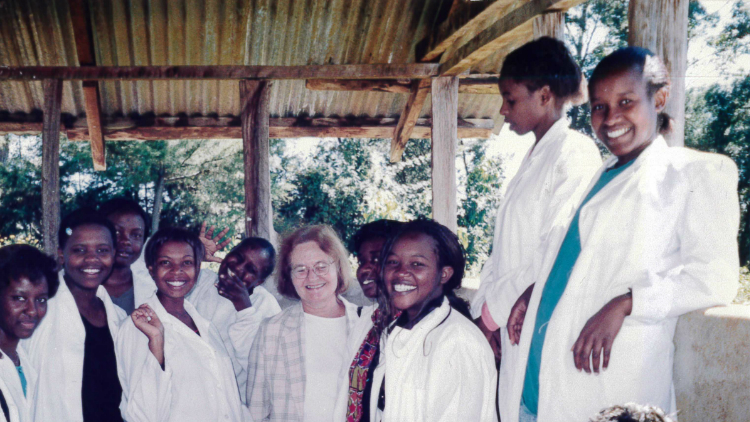
Nursing seniors at University of Eastern Africa in Kenya
Tales From A Tree House
Kohler’s impressive résumé of health care, curriculum building, and relentless giving is hard to believe ... until you meet her. At age 86, she is as agile and witty as someone half her age.
“I have a youthful outlook; I don’t think of myself as 86,” she says. She and Stauffer live in what she refers to as their “tree house,” a second-floor apartment across from Trexler Park in Allentown, with views of mature greenery from every window. It’s a small piece of wildlife compared to the chicken, strawberry, and asparagus farm she grew up on—and worked on—outside Emmaus, Pennsylvania. From her “perch” on her living room couch, she reflects on her life, as a nurse, educator, and philanthropist.
“I knew I wanted to travel the first time I looked at a geography book in third grade,” she says. “I saw photos of villages and mountains and thought, ‘oh wow, I want to go there someday.’” The first time she traveled overseas was to attend international summer school at the University of Oslo in Norway. “Once I got started traveling, I couldn’t stop,” she says.
Her first trip to West Africa was to set up a public health nursing curriculum at Cuttington University in Suacoco, Liberia. “At the time, I was enrolled in the PhD program at UNC. The recruiter called in the morning and invited me to take a four- year assignment to set up the program at Cuttington. I hung up, thought about it, and called him back that afternoon to say, ‘you know, that doesn’t take four years. That’s not so hard; I can do that in two!’”
“African persistence—I learned about it in Liberia. They just don’t take no for an answer.”
When she arrived, there was only one senior ready for public health. So she and her student hopped in a VW van (and sometimes in a plane with a bush pilot) and went exploring in the bush towns for relevant experiences like setting up immunization clinics. “It was great fun,” she says.
At the end of many workdays, Kohler would visit friends who lived a mile away in a house with dirt floors. “They both had Cornell degrees—she was an elementary school principal and he was a hog farmer. I spent a lot of time with them in their palaver hut, a thatched roof shelter with hammocks where you drink bad club beer and sit on stools and palaver, or chat. There’s one of the palaver stools right there,” she says, pointing to a simple oblong piece of wood propped up against a bookshelf.
The palaver stool is among a modest array of other personal belongings in Kohler’s apartment. Except for books (her “only indiscretion”), which Kohler and her husband have stacked in shelves on almost every wall, they’ve bought very little since they moved in together 19 years ago.
“Once you get done living among people who have so little in the way of material things, you realize you don’t need so much stuff.” Don’t ask me how old my clothing is,” she jokes with an impish grin. “We just won’t go there.” She also only recently gave up her 30-year-old car. “You can’t tempt me with fancy things. I’m not interested. And that’s very freeing.”
18 of the 23 nursing majors at Cuttington University in Liberia with Helen Kohler, division chair
Their Own Little Peace Corps
Kohler’s lack of interest in possessions has freed her to put her income to very good use. Over the past 20 years, she and Stauffer have funded the education of about two dozen individuals from Kenya, from elementary school to bachelor’s degree. “We don’t do graduate school—they are supposed to do well and get a scholarship,” she says.
It all started with their yearlong trip to the University of Eastern Africa in rural Kenya as volunteer visiting professors, which they took upon their retirements, Stauffer after 43 years as a civil engineer at Bethlehem Steel and Kohler after 23 years teaching at the University of Maryland “and a lot of other places.” That trip was one of the first overseas for Stauffer. “Ron didn’t even have a passport before we got together,” Kohler says. While Kohler taught a full course load of public health, Stauffer taught mechanical drawing, industrial safety, and a math course.
Every day, they would see the same four kids hanging out by the gate to the university, which was across from what Kohler calls “a scuzzy little town.” They soon learned that the kids, ages 8, 10, 12, and 14, were refugees from Rwanda, where they had fled the dangerous aftermath of the 1994 genocide. “The parents, who had both been RNs in Rwanda, had schools picked out for their children, but they couldn’t afford them, so they were trying to homeschool,” Kohler says. After hearing the mother crying one day about her children never getting educated, Kohler and Stauffer decided to do something. “We got them all in schools, and the better schools, boarding schools.”
From there, the couple decided to make education their mission. “We were like our own little Peace Corps,” Kohler says. She and Stauffer put five AIDS orphans, nieces of her secretary, all the way through school. They paid for AIDS medicine for the dying mother of a junior nursing student. “I met the mother several years later—she’s still living and is a beautiful, healthy woman!” Kohler says.
And every year when they returned to the Kenyan campus to teach winter quarter, Kohler and Stauffer would call back students who they heard had gone home because they couldn’t pay tuition, offering to give them what they needed to earn their degrees. “They didn’t have to be nursing or engineering students; they could be in any major and we would bail them out,” she says. “We never counted exactly how many we helped between the two of us,” she says. “Somewhere around 20.”
The couple hasn’t kept in touch with all the students they’ve helped, but they regularly visit with the Rwandan refugee family: They now live in Youngstown, Ohio, and both parents have earned master’s degrees in nursing and work in the nursing field. The oldest son recently completed a PhD at Purdue, and the second son has nearly completed his PhD at Case Western. “We see that family at least twice a year,” Kohler says.
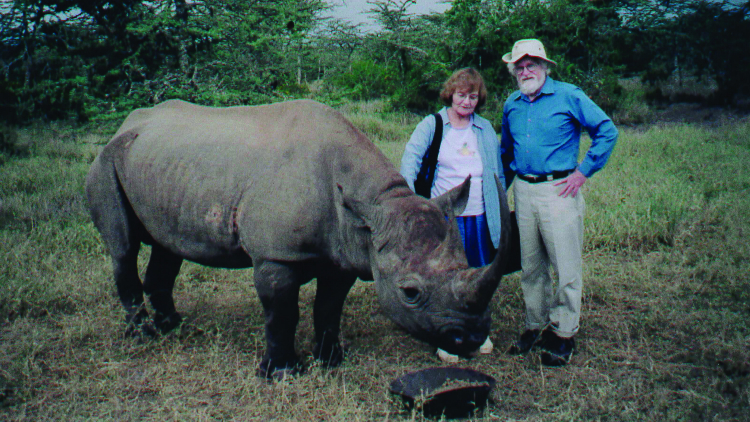
Kohler and Stauffer with Morani, a tame black rhino, near Sweetwaters Game Reserve
Tough Out There
Kohler recalls her times in West Africa and other impoverished areas very fondly, with a smile. But she doesn’t deny the reality. “It’s tough out there, especially for women,” she says.
She talks about mothers giving birth surrounded by six old women who know nothing about human anatomy; about the threats of typhoid, malaria, and yellow fever, and religiously checking screens and bed nets at every house where they stayed; and about civil wars in Sierra Leone, Liberia, Yemen, and the Democratic Republic of Congo, which make improving public health all that much more difficult.
She remembers preparing for class by the light of five candles, at the mercy of a tired old generator, and sometimes holding class on stairs under the starlight. “We called it Kenya Power and Darkness,” she jokes.
But she also talks very nostalgically about a back yard with “the most glorious starry sky,” with not a city light in view, and living smack dab in the middle of a rural Kenyan community, where she walked down the muddy path past the pigs to get to the health center every day.
Will she return to Africa? She’s not sure. If she can’t physically go, she will settle for raising awareness through teaching. “And Ron and I will keep contributing financially where it makes sense.”
No matter what, she says she wants to stay on a college campus, where the action is. It seems fitting that her career has come full circle, landing her back in the Lehigh Valley at Moravian College. “People say you can’t go home again. But you can if you’re realistic and you don’t expect it to be the same. I really wanted to go home again, and I’m glad I did.”
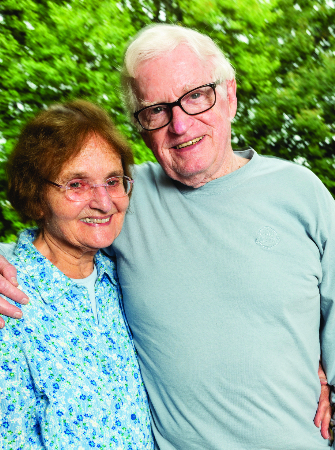
Love at Second Sight
Kohler never pegged herself as the marrying type. “I was too busy and looked at my friends married with children and thought, ‘that looks too hard—I’m not going to do that.’” That all changed the night of her 45th high school reunion, where she saw Ron Stauffer, with whom she’d shared four years in homeroom during her high school years.
“I walked up to him at the Macungie Fire Company (very classy!) and patted him on the head and said, ‘what’s this?!,’ referring to his beautiful head of white curls (in high school, they were flaming red),” she recalls. “I’m sure he thought, ‘Who’s this fresh woman?’ But the chemistry was there immediately,” she says. “Ron’s wife had died a year earlier, and he swore he would never get married again. Well anyhow, a year and a half later, we got married, and that was almost 22 years ago—time flies!”

